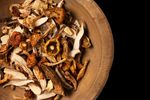Get to know your innate defense mechanisms on a deeper level.
Living through a multi-year global health crisis, it certainly comes as no surprise that strengthening our immunity is top-of-mind. Having an optimized immune system not only helps protect against sicknesses that you might encounter (like the flu or COVID-19), but also supports every system in the body — making it a key player in aging well too.
What exactly is the immune system, though, and how does this defense mechanism help protect us against illness and disease? Read on to learn more — including some surprising immune system facts that will shine light on how you can support your body, from the inside out.
How does the immune system work?
The immune system is made up of organs, cells and proteins that work together to fight common colds, the seasonal flu and yet-to-be-identified pathogens, as well as help prevent cancer and heart disease.
The immune system’s job is to spot and attack foreign invaders by creating proteins called antibodies, which have the ability to destroy abnormal or unrecognized cells. The immune system is adaptive, so it helps the body create memories of past attacks — they’re called T cells, which are white blood cells that go after targeted invaders when they try to make a return visit.
Okay, that all might sound vaguely familiar from eighth grade science class. But like most things related to our bodies, the immune system is a little more complex than how it appears at first glance.
Here, a few fascinating immune system facts you probably didn’t know about your powerful built-in defense system.
1. Your immune system can be strengthened like a muscle.
Let's start with some good news: It's completely within your power to help your immune system do its job through lifestyle changes and immune-supportive supplements. Just like your biceps or your glutes, your immunity fitness can get stronger. “The immune system is like a muscle — you need to train it to optimize its function, so when you really need to use it, it can cope with whatever it has to deal with,” explains Frank Lipman, MD, our Chief Medical Officer.
RELATED: 30 Ways to Strengthen Your Immunity
2. You don’t want to “boost” your immune system too much.
It’s a common term people use when talking about improving your immunity, but the word “boost” is a little misleading. The reason: The immune system is a complex balancing act. You don’t want it to underreact and allow invaders to take hold, but you also don’t want it to overreact. This results in an immune response known as a cytokine storm, which can lead to hyperinflammation that can seriously harm or even kill a patient, as has happened in some COVID-19 cases, Lipman notes.
Instead, you want your immune system to be strong, balanced and ready to jump into action — without going into overdrive.
3. The majority of your immune system originates in your gut.
An astounding 70 percent of your immune system’s functionality is regulated in your gut, where trillions of bacteria live. That’s why nurturing the beneficial bacteria housed there (and keeping the bad guys at bay) is critical to mounting a strong immune response.
Properly caring for your microbiome (a.k.a. the microbes that live in your gut) requires a multi-pronged approach that includes proper nutrition, supplementation and more. Sometimes it also requires a cleansing system-reboot to repair damage and chase away proliferating harmful bacteria.
A good place to start nurturing your gut is by feeding the friendly bacteria that reside there. One of the best ways to do that is by adding a probiotic to your supplement routine, like our Essential Probiotic, which contains 10 of the most well-researched and most powerful probiotic strains. Each has a specific, functional strength that collectively enhances and maintains immune and digestive health.
RELATED: 6 Ways an Out-of-Balance Gut Affects Your Well-Being
4. Mushrooms can provide major benefits for your immune system.
Medicinal mushrooms (not to be confused with mind-altering magic mushrooms) have been shown to have immunomodulating effects, meaning they help keep the immune system in balance. ‘Shrooms can provide a rich source of nutrients and bioactive compounds called beta-glucans that can enhance innate and adaptive immune responses.
But you have to choose the right type: Chaga, reishi, turkey tail, shiitake, maitake, lion’s mane and cordyceps have all been shown to have immune-balancing effects and antioxidants, which help fight free radicals in the body.
RELATED: The Secret Immune-Boosting Power of Mushrooms
"Turmeric has anti-inflammatory, anti-viral, anti-bacterial and anti-tumor properties."
5. Antioxidants not only protect against aging, but they also help improve your immunity.
Antioxidants are substances that help protect the body against damage from free radicals (harmful molecules that are linked to disease). Two of Lipman’s favorite antioxidants for immunity are turmeric (yes, the same flavorful yellow spice you put in curry!) and the lesser-known N-Acetyl L-Cysteine, or NAC.
“Turmeric has well-known anti-inflammatory, anti-viral, anti-bacterial and anti-tumor properties,” he explains. “Moreover, this bright yellow spice boosts mitochondrial health, reducing the amount of free radicals produced by aging or dying mitochondria.” Find highly bioavailable, easy-to-absorb curcumin in our Turmeric Protect supplement.
NAC is a supplement that acts as a precursor to the powerful antioxidant glutathione. Research suggests glutathione might impact longevity by fighting the negative effects of oxidative stress that lead to many chronic diseases.
RELATED: NAC: The Do-it-All Supplement You've Never Heard Of (Until Now)
Some researchers even predict that NAC could potentially decrease the infectivity and prevent the severity of COVID-19. Several clinical trials are underway to test its effectiveness on coronavirus patients. “So in times like this, especially with colder weather coming, it’s a great supplement to be taking,” adds Lipman.
Plus, as we age it’s even more important to add NAC to your routine. “Although the body can produce glutathione naturally, we produce less of it as we get older,” Lipman notes. “Thus the need to take some NAC to top off your tank.”
Need to up your intake? Shop THE WELL Clean-Up Crew, a hard-working supplement containing 900mg of NAC to support liver detoxification, respiratory health and muscle recovery.
6. You don't want to overdo it on exercise.
Research shows a compelling link between physical activity and the body’s defense system. Regular exercise boosts immune function by raising levels of infection-fighting white blood cells, increasing circulation and decreasing stress hormones. Habitual exercise can also improve immune regulation, delaying the onset of the immune-function decline that typically happens as we age.
One caveat: The positive impact seems to go south when the exercise training becomes too intense. Shorter bouts of moderate exercise have an anti-inflammatory effect and stimulate the immune system, whereas prolonged (60 minutes or longer), vigorous exercise can release immune-suppressing stress hormones. So when it comes to exercise, the key may be working smarter, not harder.
Try adding in some movement to your exercise routine that has a mindful element such as yoga, Pilates, or QiGong. Walking counts, too!
RELATED: Why Everyone — Not Just Older Adults — Can Benefit from QiGong




